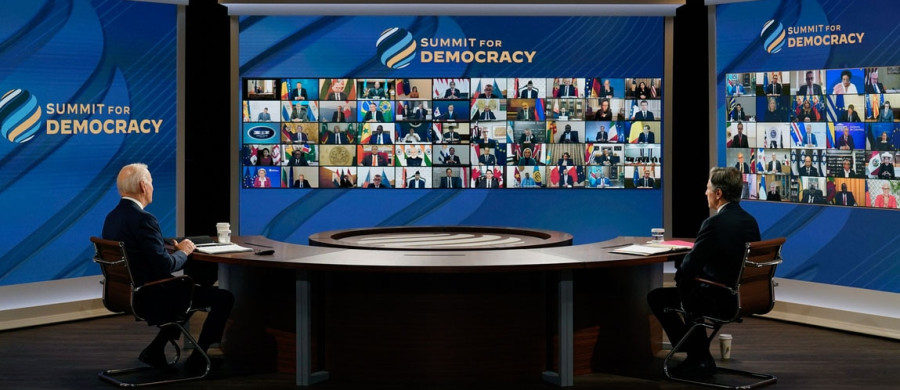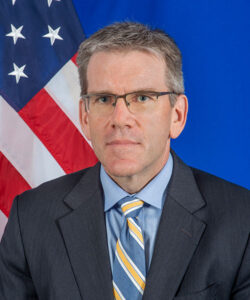Columns
A global community stands up for democracy
Despite all that the democratic countries of the world have accomplished, there remain serious challenges.
Dean R Thompson
This week, countries around the world have gathered to reinforce the importance of democracy to the wellbeing of the global system and to assess our common commitment to ensure democracy delivers for our citizens. The second Summit for Democracy, jointly hosted by the Republic of Korea, the Republic of Zambia, Costa Rica, the Netherlands, and the United States, has brought together approximately 121 nations and leaders, as well as leaders from civil society and the private sector. Their goal is to address common difficulties facing our world; showcase progress on last year’s pledges and announcements; and commit again to take part in a global democratic renewal.
Why is this important? In President Joe Biden’s words, “[A]s a global community for democracy, we have to stand up for the values that unite us.” Currently, a majority of people lack the basic right to self-govern. They live under autocracies, authoritarianism, and dictatorships—many under the façade of having freedom through false elections and leaders who corrupt the word “democracy.” Over the last few years, we have been seeing the threads of the fabric of democracy fray. If we let it unravel, citizens throughout the world will be denied the opportunity to determine their own futures.
Today, we know there are countries whose leaders disregard the will of the people; where history is distorted to advance contemporary political agendas and the State withholds information from its people; where a citizen’s every move is surveilled; where peaceful dissent is met by arrest and sham trials; where individuals’ religious beliefs and practices are restricted or outright denied; and where journalists and a free press—the most potent antidote to government abuses—are silenced.
Authoritarian governments spread disinformation, seeking to affect election outcomes or stoke tensions in other countries. Corruption buys and sells political and economic power at the expense of the will of the people. And without provocation, Russia’s leader launched a brutal and unjustified war against a sovereign democratic state, violating the UN Charter and flouting the principles that undergird international peace.
The joint hosts of this year’s Summit for Democracy recognise that it is time for democracies to engage in collective action to protect freedom. At the first Summit for Democracy, participating governments and authorities announced nearly 750 commitments aimed at strengthening and safeguarding democracy at home and abroad. The United States announced meaningful steps to build a more resilient democracy. Nepal expressed its “full commitment to the democratic system and . . . periodic elections and universal suffrage, separation of power, checks and balance, independence of judiciary, protection and promotion of human rights and fundamental freedoms, individual liberty, press freedom and the rule of law.” While all participants’ Summit commitments remain works in progress, the democracies of the world should be proud of what has been accomplished since the previous Summit for Democracy, just 16 months ago.
In May 2022 and November 2022, Nepal held national elections, which observers noted were free, fair, and overall peaceful. Men and women; LGBTQI+ persons; older persons and first-time election participants; rich and poor; abled-bodied and persons with disabilities; and members of different castes, religions, and communities all cast their ballots. Their votes led to a peaceful transfer of power.
Nepal is an example of a country striving for change, realising its constitutional aspirations of an inclusive democracy, and building a better future for all its citizens. Nepal is working to ensure meaningful participation of minorities in the political process and is taking measures to ensure its government composition embodies the people it represents.
On human rights and rule of law, thus far, the Nepali government has passed legislation to prevent and respond to gender-based violence, including by increasing the statute of limitations for rape and strengthening punishments for perpetrators of acid attacks. Nepal has promoted the human rights of LGBTQI+ individuals, making it a leader in South Asia on this issue. The Nepali government also continues to work toward having a Nepali-led, victim-centred transitional justice process that meets international standards. Recently, all seven parties of the then-ruling coalition indicated transitional justice will be a top priority of the new Parliament, and there is continued public discourse that seeks to keep this important item on Parliament’s agenda. Lastly, Nepali courts have shown judicial independence, with judges issuing rulings independently and in accordance with the rule of law, rather than in deference to any particular politician or party line.
The United States has made its own commitments. At the first Summit, we announced $424.4 million toward the Presidential Initiative for Democratic Renewal (PIDR), a landmark set of foreign policy and foreign assistance initiatives that build upon the US government’s significant, ongoing work to bolster democracy and defend human rights globally. In the last year, through the PIDR, we have worked to increase protections for a free and independent press, combat corruption, and strengthen electoral integrity, both at home and abroad. These commitments set forth that democracy that is solving global challenges and improving people’s lives. And the vibrant media and civil society sectors in both the United States and Nepal have repeatedly proven that we are democratic countries capable of self-reflection and improvement, despite our challenges and problems.
The US government has continuously supported independent media in low- and middle-income countries and will soon launch an innovative insurance vehicle that will cover the cost of defending journalists, civil society activists, and their organisations from defamation, libel, and other lawsuits meant to silence their reporting. In Nepal, the US Embassy in Kathmandu has partnered with media organisations to combat disinformation and train individuals from marginalised backgrounds in Nepal who are interested in journalism. We also have offered reporting tours where Nepali journalists travel to the United States to engage with US media and report on issues from their own perspectives.
The United States has also expanded the fight against corruption by increasing efforts to hold corrupt actors accountable and by denying safe haven to them and their ill-gotten gains. We’re working with our partners in the international community, including Nepal, to prevent corruption and strengthen the rule of law; empowering civil society, media, and the private sector; and responding decisively to threats. Abroad, we are providing robust assistance to counter and mitigate corruption.
As a key commitment, the United States vowed to strengthen electoral integrity. Domestically, President Biden’s budget proposed the largest-ever investment in election infrastructure. Globally, the US government has helped develop a network for securing electoral integrity. The US Embassy in Kathmandu, through USAID, has supported Nepal’s democratic growth through partnerships with the government, civil society organisations, and the public to strengthen democratic principles and further Nepal’s own transition to federalism.
Despite all that the democratic countries of the world have accomplished in the last year, there remain serious challenges to address: Disinformation, political and social instability, corruption, and the erosion of voting rights and human rights. These conditions can lead to distrust in government and result in apathy, low voter turnouts, and distaste for public service by people who could greatly contribute to their communities and their countries. Democracy is the hardest form of government, but the one overwhelmingly most capable of benefitting individual citizens and communities writ large. It is worth the hard work and must not be taken for granted. United with our democratic friends and partners like Nepal, whose renewed commitment to democracy has set an example, we’ve set a course to meet the challenges we face together and secure a better, more equitable, prosperous, and democratic world for us all.




 8.54°C Kathmandu
8.54°C Kathmandu















